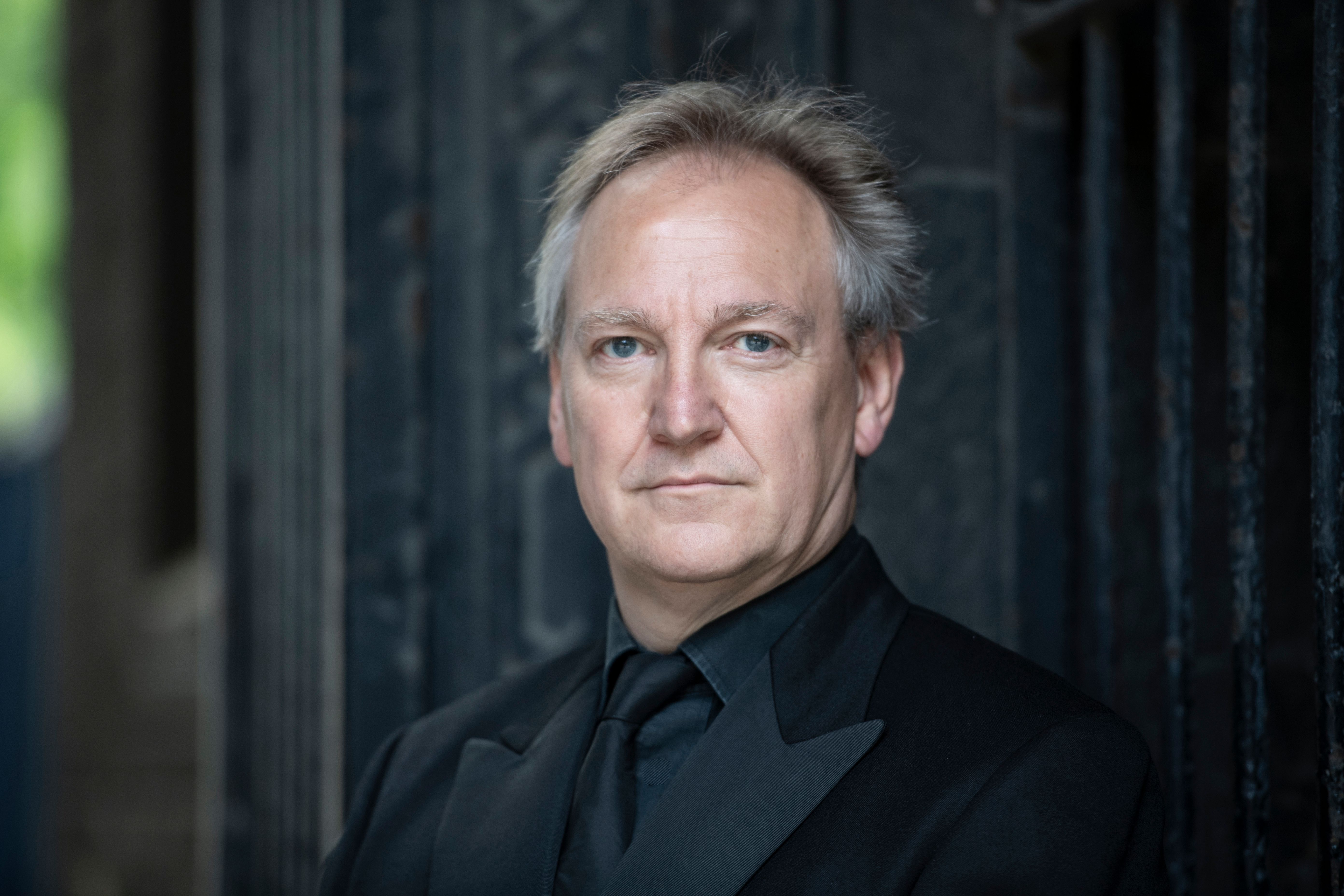A year into the pandemic, it is hard to imagine anybody relishing the prosect of Lenten austerity. But the liturgical calendar trundles on, and here we are in Holy Week. The aptly named Tenebrae Choir, under conductor Nigel Short here offer a traditional Lent programme, mostly solemn but with a few lighter numbers. At the heart were three Bach motets, contextualised by similar music from earlier and later centuries: Schütz, Reger and James MacMillan.
The Wigmore Hall stage proved insufficient for the ten singers, given social distancing requirements, and an extension had to be added at the front, with Short (pictured below by Sim Canetty-Clarke) standing several rows into the stalls. The combination of widely spaced singers and an audience-free hall made the Wigmore acoustic particularly warm and resonant – very fitting for the programme.
Framing the familiar Bach works with lesser-known numbers from Schütz and Reger had the effect of emphasising the modernity of Schütz and traditionalism of Reger, at least in his sacred music. The open Schütz motet, Das ist je gewißlich wahr, is a work of surprising tonal richness, and was given in warm and opulent tone by the Tenebrae singers. A solemn but complex Amen brought the motet to an impressively resonant close.
That feeling of resonance, in the empty Wigmore Hall, was just as evident in Bach’s Komm, Jesu, komm, the opening ‘Komm’ invocations each followed by a generous pause for the extended decay. But that did not affect the clarity of the textures, with the singers’ individual lines all clearly marked out in Bach’s increasingly complex counterpoint. Following on with Reger’s O Tod, wie bitter bist du, was inspired programming. Reger follows the mood and tone of Bach’s unaccompanied choral music, but adds sophisticated chord progressions and more dramatic dynamic contrasts. Tenebrae found an ideal balance here, giving appropriate drama and weight to the dynamic swells, but without exaggerating the effect. Reger’s motet ends with a richly textured, homophonic chorale, which made the final work of the set, the Bach chorale Wenn ich einmal soll scheiden, seem redundant.  The second half was a similar mix. Two songs from Reger’s op. 138 showed his gentler side. This was music that he was working on while dying, and we find the ailing composer still writing warm, richly voiced textures, but with less of his trademark counterpoint. The main work of the programme was Bach’s large-scale motet Jesu, meine Freude. Nigel Short took an expansive approach, the tempos steady and the textures generally bottom-heavy. That gave the basses the scope to present Bach’s bass lines with focus and weight, and, again, the counterpoint was beautifully clear throughout the ensemble. A number from the Schütz Matthew Passion followed, Ehre sei dir Christe, a more Bach-like number from him, although the limited ambition of his counterpoint was highlighted by being framed by two Bach motets. The last of these, Singet dem Herrn ein neues Lied, was presented as a joyful conclusion to the programme. A rise in dynamics here led to a strain on the choir’s tonal control, though only for a few phrases, and their counterpoint and balance were clear as ever.
The second half was a similar mix. Two songs from Reger’s op. 138 showed his gentler side. This was music that he was working on while dying, and we find the ailing composer still writing warm, richly voiced textures, but with less of his trademark counterpoint. The main work of the programme was Bach’s large-scale motet Jesu, meine Freude. Nigel Short took an expansive approach, the tempos steady and the textures generally bottom-heavy. That gave the basses the scope to present Bach’s bass lines with focus and weight, and, again, the counterpoint was beautifully clear throughout the ensemble. A number from the Schütz Matthew Passion followed, Ehre sei dir Christe, a more Bach-like number from him, although the limited ambition of his counterpoint was highlighted by being framed by two Bach motets. The last of these, Singet dem Herrn ein neues Lied, was presented as a joyful conclusion to the programme. A rise in dynamics here led to a strain on the choir’s tonal control, though only for a few phrases, and their counterpoint and balance were clear as ever.
James MacMillan’s O Radiant Dawn was presented as an encore – curiously, given the lack of audience or applause. MacMillan’s liturgical music can seem utilitarian and workaday in concert, especially compared to Reger’s more adventurous settings earlier on. But the work was beautifully sung here, and served its purpose, to bring a small ray of sunlight to the ending of an otherwise austere programme.














Add comment